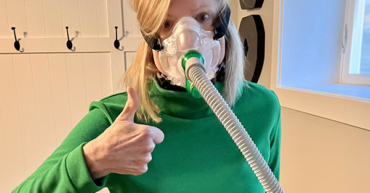May 16, 2024
Our Overlooked Heroes

By Julie Gregory, Chief Health Liaison for Apollo Health
In many ways, our care partners are the backbone of our community. All of the husbands, wives, sons, daughters, nephews, nieces, friends, and even devoted staff members who support those using the protocol through every stage of the program make this life-saving approach possible. Your loved ones wouldn’t have the opportunity to stabilize or improve from this devastating disease without your dedication and selflessness, which you might think goes unnoticed; It does not. I see you. I am one of you. I recognize your sacrifice. The impact we are making on the future of our loved ones is immeasurable and even extends to society at large.
As many of you already know, the emotional toll of caring for someone with Alzheimer’s can be overwhelming. We are often needed to help juggle the daily activities of living, as well as provide medical and emotional care. When practicing the protocol, we also take on the role of chef, exercise trainer, sleep coach, and more. Many of us are thrust into this role unexpectedly, and our journeys can be both challenging and rewarding.
Caregiving can affect every facet of our lives — our careers, relationships, and especially our ability to engage in self-care. These demands can leave us feeling alone, frustrated, and emotionally drained. The care required by your loved one can be all-encompassing, at times depriving us of the life we once enjoyed or planned to enjoy with our affected family member or friend.
Some have described Alzheimer’s as the long goodbye. Both the care partner and loved one are going through a grieving process, not unlike the stages of death outlined by Swiss American psychiatrist Elizabeth Kubler-Ross: denial, anger, bargaining, depression, and acceptance. Dr. Kubler-Ross’s stages, however, presume a one-way trajectory toward inevitable decline. By using the protocol, we are inserting new disruptive stages like resisting and improving. For the first time in history, we needn’t give in to inevitable decline. By doing all that we can to help our loved ones fight this progressive disease, we are showing the world what is possible. But that doesn’t mean that it’s easy for you.
Strategies for Care Partners
1) Create a team. This is incredibly important when practicing the protocol, as it’s very easy to feel isolated or even criticized by other professionals or family members who don’t understand what you are doing. Do your best to educate them. One way of doing this is to share copies of The End of Alzheimer’s Program, which provides a nice summary of the protocol strategies with scientific justification. Ideally, your loved one’s primary care physician would be on board. Many younger physicians, who don’t formally practice functional medicine, are becoming more open to medical innovation and holistic health practices. It’s very important, when working on reversal, to include a ReCODE 2.0 Certified Practitioner, who is an M.D., D.O., or a licensed naturopathic doctor. A health coach can be another invaluable team member. See Grow Your Brain with a ReCODE 2.0 Health Coach to better understand all that a coach can provide. Finally, include as many family members and friends as possible. In my family, we have an ongoing text thread for all care partners so that we can share daily frustrations and successes. This keeps everyone up-to-date and allows for easier scheduling and communication.
2) Adopt the protocol. Obviously, only adopt the parts that make sense for you. For instance, the first four strategies in the Bredesen Seven: nutrition, exercise, sleep, and stress are the foundation of optimal health for everyone. By also applying these strategies, you’ll be acting as a role model for your loved one. See Pulling Not Pushing to understand the power behind serving as a mentor of the protocol. These diet and lifestyle changes will also radically transform your own health — increasing your strength and energy, enabling you to fulfill your care partner role more easily.
3) Accept help. You can’t do this alone. Allowing others to help is not a sign of weakness but rather a sign of strength. We encourage everyone to create a care partner team so that multiple family members and friends can be involved in caregiving. In my family, we have some team members who can only help out a few times a month, but their participation is still greatly appreciated. If it’s hard to ask for help, start with small requests. Some find it easier to send a text or email rather than make a phone call. Many organizations also provide professional respite care that can enable you to take a few hours a week to yourself or even enjoy a much-needed vacation, knowing your loved one is safe.
4) Make time for self-care. This is the hardest one of all, but probably the most important. Dementia caregivers are at greater risk for anxiety, depression, and substance abuse and are six times more likely to develop dementia themselves. By following the first three strategies outlined above, you will already have an enormous head start on self-care. As the wife of an airline pilot, I recognize why flight attendants remind us to put on our own oxygen masks first. I take that advice very literally by practicing EWOT every morning before heading to my mother’s care facility. It’s an easy way to get all of the benefits of a long aerobic exercise session in just twenty minutes. See My Experience with EWOT to learn more. You needn’t go to that extreme, but do whatever you need to do to care for yourself (take a walk in nature, journal, meditate, etc.) before caring for your loved one. Self-care takes extra time and dedication, but it will help to provide the strength you need. Because caregiving is so emotionally draining, it’s incredibly important to connect with other care partners. Apollo Health subscribers can join one of our Care Partner Support Groups or connect with other care partners on our Community Forum. Non-subscribers can join the Official Bredesen Protocol Support Group, a private, moderated community for care partners and anyone following the protocol.
All dementia caregivers are heroes, but our care partners face extra challenges with grace and strength. You are valued, respected members of our community, helping to stabilize and improve your loved one’s cognition and overall health while re-writing the Alzheimer’s story for everyone.




